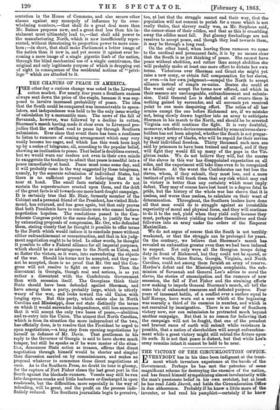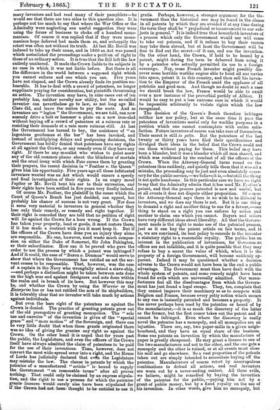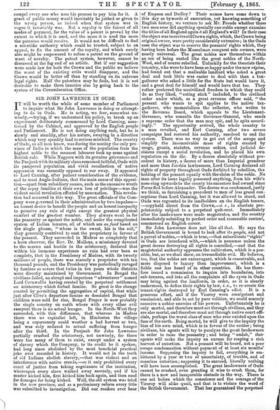THE VICTORY OF THE CIRCUMLOCUTION OFFICE- E VERYBODY has in his
time been indignant at the treat- ment which inventors experience at the hands of the Government. Perhaps he has met the patentee of some magnificent scheme for destroying the enemies of the nation, and has found himself sympathizing almost involuntarily with, the man's passionate belief in his own crotchet, but at least. he has read Little Dorrit, and holds the Circumlocution Office in due abhorrence. Probably if he knew a little more of the inventor, or had read his pamphlet—certainly if he knew many inventors and had read many of their pamphlets—he would see that there are two sides to this question also. It is perhaps not too much to say that where the War Office or the Admiralty were neglecting one useful suggestion they were using the forms of business to choke off a hundred mono- maniacs. Of course it was replied that if they were mono- maniacs hope deferred had made them so, and unhappily the retort was often not without its truth. At last Mr. Boy ill was induced to take up their cause, and in 1860 an Act was passed which assimilated the proceedings under a petition of right to those of an ordinary action. It is true that the Bill left the law entirely unaltered. It made the Crown liable to its subjects in no case in which it was not liable before. But there is all the difference in the world between a supposed right which you cannot enforce and one which you can. Five years have not elapsed, and the Crown already finds its position un- bearable. It has to deal with a crowd of patentees, no longer suppliants praying for consideration, but plaintiffs threatening an action. The invention may have, in nine cases out of ten probably has, neither novelty nor utility, but the so-called inventor• can nevertheless go to law, as not long ago Mr. Clare did, and leave the nation to pay the costs. And as inventors are " legion " the Government, we are told, can now scarcely drive a bolt or hammer a plate on a new iron-clad without buying off a crowd of patentees at a ruinous rate or resisting their demands at a rate more ruinous still. At last the Government has turned to bay, the assistance of " an ingenious gentleman at the bar" has been invoked, and instead of multiplying delays and postponing decisions, the Government has boldly denied that patentees have any rights at all against the Crown, or any remedy even if they have any right. If there be any moralist who wishes to point anew any of the old common-places about the blindness of mortals and the cruel irony with which Fate curses them by granting their prayers, the recent decision in " Feather v. the Queen" gives him his opportunity. Five years ago all these infatuated inventors wanted was an Act which would ensure a speedy and final investigation of their rights. In an angry mood Jupiter or Mr. Bovill bent his ear to their entreaties, and their rights have been settled in five years very finally indeed. Of course Mr. Feather, the plaintiff in the cause which the Court of Queen's Bench has just decided, can appeal, but probably his chance of success is not very great. Nor does it seem very material to inventors in general whether they lose only their remedy, or remedy and right together. If their right is conceded they are told that no petition of right will lie against the Crown for a bare wrong. If the Crown has taken your property, land or goods, it must restore them, if it has made a contract with you it must keep it. But if the officers of the Crown have done you an injury they alone are responsible. No one, however, need waste much compas- sion on either the Duke of Somerset, Sir John Pakington, or their subordinates. How can it be proved who gave the order to use the process by which a patent was infringed ? And if it could, the case of "Baron v. Denman" would serve to show that where the Government has ratified an act the ser- vant ceases to be responsible. That, however, was the case of a captain in the Navy who wrongfully seized a slave-ship, —and perhaps a distinction might be taken between acts done on the high seas and against foreigners and acts done within the realm and in breach of its laws. But however this may be, and whether the Crown by using the Warrior or the Enterprise has or has not ratified the acts of its shipbuilders, it is tolerably clear that no inventor will take much by actions against individuals.
But even the bare right of the patentees as against the Crown is denied. The practice of granting patents grew out of the old prerogative of granting monopolies. The " sole use and exercise " of the invention is given of the " special grace" and "mere motion" of the Sovereign, and there can be very little doubt that when these grants originated there was no idea of giving the grantee any right as against the Crown. On the other hand it is urged that for years past the public, the Legislature, and even the officers of the Crown itself have always admitted the claim of patentees to be paid for the use of their inventions. Time, however, does not convert the most wide-spread error into a right, and the House of Lords has judicially declared that even the Legislature may mistake the law. The clause in patents by which the patentee of a manufactured " article " is bound to supply the Government " on reasonable terms" after all proves nothing. That could only be claimed by an express stipula- tion, and the right to use a process for which the patentee grants licences would surely also have been stipulated for if the Crown had not been . thought to be entitled to use it gratis. Perhaps, however, a stronger argument for the Go- vernment than the historical one may be found in the clause in all patents by which they are avoided if at any time during the term they shall be "prejudicial or inconvenient to our sub- jects in general." It is indeed true that henceforth inventors of a process which only the Government would use will cease to take out patents, and if it refuses to buy their secrets may take them abroad, but at least the Government will be free to find out the secret—if it can, and use the invention. On the other hand, the Crown, if held to be bound by a patent, might during the term be debarred from using it by a patentee who actually permitted its use to a foreign sovereign. Nay, some French inventor might possibly dis- cover some horrible warlike engine able to hoist all our navies into space, patent it in this country, and then sell his inven- tion to the Emperor of the French amid the applause of all patriotic and good men. And though no doubt iu such a case we should break the law, France would be able to exult over a new instance of the proverbial perfidy of Albion. It would be easy to put a less extreme case in which it would be impossible arbitrarily to violate rights which the law recognized.
_ The decision of the Queen's Bench therefore infringes neither law nor policy, but at the same time it puts the patentees of inventions useful only for warlike purposes in a position which one cannot contemplate with entire satis- faction. Future inventors of course can take care of themselves. Their secret is still in petty. But the patentees of the last twenty or thirty years have filed their specifications and divulged their ideas in the belief that the Crown could not use them without paying for them. This belief may have been a blunder, but it was a blunder which all men shared, and which was confirmed by the conduct of all the officers of the Crown. When the Attorney-General turns round on the patentees thus suddenly, and quietly tells them that it was all a mistake, the proceeding may be just and even absolutely neces- sary for the public service,—we believe it is, —but still the th Ong is not quite handsome. In this particular case we have no right to say that the Admiralty admits that it has used Mr. Feather's patent, and that the process patented is new and useful, but at all events it does not dispute either proposition. Of e Jut se the Attorney-General says there is no wish to be illiberal to inventors, and we dare say there is not. But it is one thing to demand a right and another thing to sue for a favour,—one thing to stand on a right you can enforce by action and another to claim one which you cannot. Buyers and sellers have very different ideas about liberality. All that the Govern- ment needs is the right to make use of the patented process, just as it can buy the patent article on fair terms, and it is, we are convinced, its best policy to concede to the inventor a statutory right to a reasonable royalty. The public has an interest in the publication of inventions, for Government offices are not infallible, and it is quite possible that they may refuse to buy a secret the value of which, when it is the property of a foreign Government, will become suddenly ap- parent. Indeed it may be questioned whether a decision adverse to the Crown would not have been in the end a public advantage. The Government must then have dealt with the whole system of patents, and some remedy might have been found for evils which are universally admitted. Our manu- facturers feel all the disadvantages from which the Govern- ment has just found a legal escape. They, too, complain that they cannot improve their machinery so as to compete with Belgium and France, because every petty notion which occurs to any one is instantly patented and becomes a property. It has never perhaps been used by the patentee or heard of by the manufacturer,—it is as much the discovery of the latter as the former, but the first comer takes out the patent and it cannot be infringed. Even where the discovery is really novel the patentee has a monopoly, and all monopolies are an injustice. There are, say, two paper-mills in a given neigh- bourhood, and they have an equal share of-the business. Some one patents an invention by which the manufacture of paper is greatly cheapened. He may grant a licence to one of the two manufacturers and not to the other, and the one gets a monopoly and the other is ruined, or at all events must close his mill and go elsewhere. So a vast proportion of the patents taken out are simply intended to necessitate buying off the patentee. Manufacturers of course retort by unscrupulous combinations to defend all actions, and real inventors are worn out by a never-ending contest. All these evils, we believe, might be remedied by buying the invention of the patentee for the public,—paying him not by a grant of public money, but by a fixed royalty on the use of his invention. In other words, give him no monopoly, but compel every one who uses his process to pay him for it. A grant of public money would inevitably be jobbed or given to the wrong person, as indeed when that system was in vogue it invariably was. But a royalty is the fairest of all modes of payment, for the value of a patent is proved by the extent to which it is used, and the more it is used the more the patentee would receive. It would not be difficult to find a scientific authority which could be trusted, subject to an appeal, to fix the amount of the royalty, and which surely also might be empowered to refuse a patent on the ground of want of novelty. The patent system, however, cannot be discussed at the fag end of an article. But if our suggestion were made law for both the Crown and the public we believe the worst of the existing evils would disappear, and the Crown would be better off than by standing on its extreme legal rights. Half the patentees may be fools, but it is not -desirable to make them lunatics also by going back to the system of the Circumlocution Office.
































 Previous page
Previous page